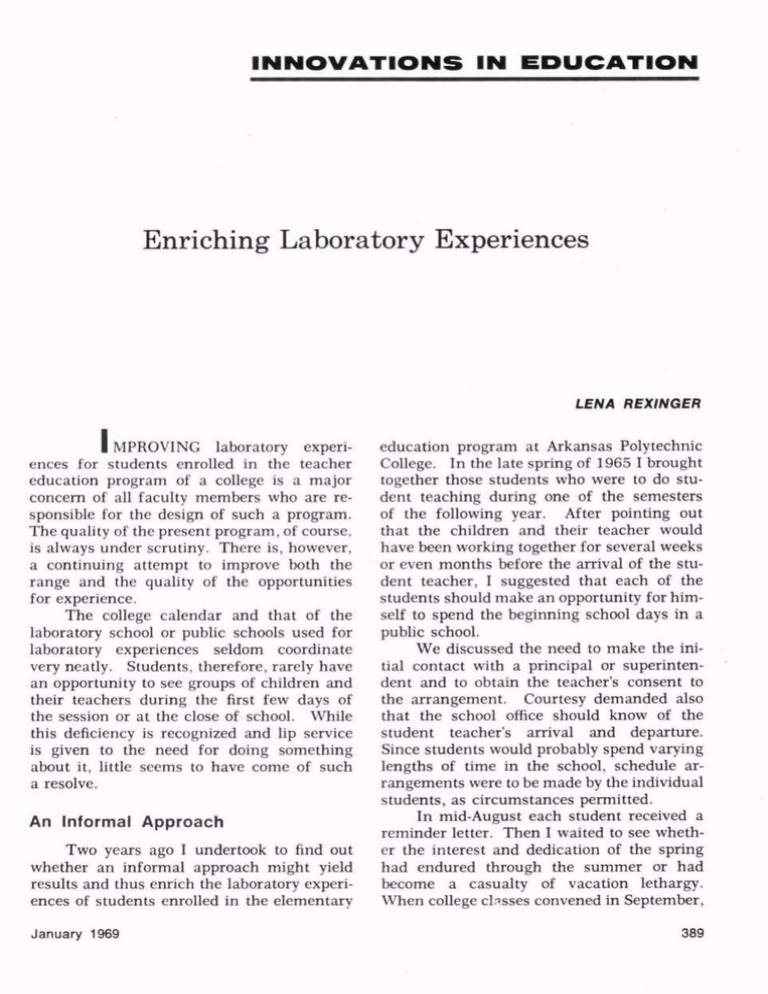
INNOVATIONS IN EDUCATION
Enriching Laboratory Experiences
LENA REXINGER
IMPROVING laboratory experi
ences for students enrolled in the teacher
education program of a college is a major
concern of all faculty members who are re
sponsible for the design of such a program.
The quality of the present program, of course,
is always under scrutiny. There is, however,
a continuing attempt to improve both the
range and the quality of the opportunities
for experience.
The college calendar and that of the
laboratory school or public schools used for
laboratory experiences seldom coordinate
very neatly. Students, therefore, rarely have
an opportunity to see groups of children and
their teachers during the first few days of
the session or at the close of school. While
this deficiency is recognized and lip service
is given to the need for doing something
about it, little seems to have come of such
a resolve.
An Informal Approach
Two years ago I undertook to find out
whether an informal approach might yield
results and thus enrich the laboratory experi
ences of students enrolled in the elementary
January 1969
education program at Arkansas Polytechnic
College. In the late spring of 1965 I brought
together those students who were to do stu
dent teaching during one of the semesters
of the following year. After pointing out
that the children and their teacher would
have been working together for several weeks
or even months before the arrival of the stu
dent teacher, I suggested that each of the
students should make an opportunity for him
self to spend the beginning school days in a
public school.
We discussed the need to make the ini
tial contact with a principal or superinten
dent and to obtain the teacher's consent to
the arrangement. Courtesy demanded also
that the school office should know of the
student teacher's arrival and departure.
Since students would probably spend varying
lengths of time in the school, schedule ar
rangements were to be made by the individual
students, as circumstances permitted.
In mid-August each student received a
reminder letter. Then I waited to see wheth
er the interest and dedication of the spring
had endured through the summer or had
become a casualty of vacation lethargy.
When college classes convened in September,
389
each student was asked to write a report of
his own experience.
The material that follows seems to give
evidence of the value of the experiment.
Moreover, the extensive evaluation and the
comments by the students indicated that they
felt that the time was profitably spent. In
many cases they recommended that the ex
perience be made a regular feature of the
elementary education program.
Students worked with Grades 1 to 6 in
clusively. A school in the remote Ozark
mountains area was represented; so was the
small-town school, the rural consolidated
school, and a city system with 22 elementary
schools. One young man on military duty
in southern Louisiana asked and received
permission from his commanding officer to
leave the post, when he was not on duty, to
observe in one of the public schools.
January 1969
Range of Duties
The duties of the students varied greatly.
Students had an opportunity to become ac
quainted with some of the activities that
soon would be their responsibilities. The
activities in which they engaged were of two
kinds: accomplishing routine duties and
helping children individually or in small
groups. The activities included checking
books in the classroom library, making a
folder for each child, attaching a name
sticker to each child's locker, making name
tags for the children, checking art and physi
cal education supplies, taking globes, maps,
and record players out of the storage room,
compiling information on 3 x 5 cards for
each child, helping issue state-adopted text
books, typing and mimeographing notes to
parents, helping children find the rooms to
391
which they were to report, and collecting
fees.
Other duties involved helping individual
pupils with "just about everything," reading
a story to the group, accompanying children
on errands, directing outdoor games, help
ing children locate library books, repeating
instructions to individuals who had not un
derstood them, showing children how to hold
a pencil, helping left-handed children with
their writing.
This experience also gave the student a
chance to observe the interaction between
teacher and children during these early days
together, and to gain some awareness of the
planning that must take place before the
children arrive. The students saw teachers
discussing with children tentative plans for
the semester's work, introducing children to
cooks, janitors, and other non-teaching per
sonnel, planning with children for classroom
policies and procedures, discussing with the
group the role of the principal, looking over
children's permanent records which included
samples of work, making charts dictated by
the group, welcoming children who had not
been in the school previously.
First Days at School
The students were also sensitive to the
children's reactions. They reported that the
children seemed excited and happy, giving
the impression that they were glad to be
back in school. The pupils became inter
ested in their own name tags and those of
their classmates; tried to follow instructions;
seemed full of energy and questions; were
relieved that they could remember their seats
when they returned on the second day; and
they showed great shyness.
To give the flavor of the experience,
a few direct quotations from the papers of
the students are included here;
• You read about these things in books,
January 1969
but nothing will drive home the point like ex
periencing it at firsthand.
• Some hadn't written during the whole
summer or hadn't held a pencil. Some really
had to think before they wrote their name.
• One child in the first grade could read
anything he picked up. He could read science
books and easily recognized such words as
"waterproof." "sprinkle." and "preened."
• Not only did I view individual differ
ences in the children, but also in the teachers.
In addition, I saw that in reality not all teachers
have the same philosophy of teaching at all. I
heard and saw many different teachers and yet
my philosophy was different from theirs.
• The children who had attended Head
Start were more advanced in many ways. They
played better with the other children on the play
ground. Also they called their teacher Mrs.
Brown, not just "teacher."
• No student can visualize the numerous
and various jobs that are necessary the first week
of school.
• I thought that the majority of the class
would be unhappy because their summer vaca
tion had ended, but they seemed as if they were
looking forward to school opening.
• I felt a glow of helpfulness and accom
plishment.
Already the student teachers who are
now juniors are asking whether they will
have a chance to go into a public school in
the fall. They will.
Looking at the whole picture, it seems
obvious that when young men and women
are challenged with the initiation and accom
plishment of a project that has meaning for
them and potential for helping them to be
come more effective teachers, they will be
overwhelmingly responsive. Thus they will
enrich their own professional background
and improve the teacher education program
of the college in which they are enrolled.
•LENA REXINGER, Professor of Elemen
tary Education, Arkansas Polytechnic Col
lege, Russellville.
393
Copyright © 1969 by the Association for Supervision and Curriculum
Development. All rights reserved.


